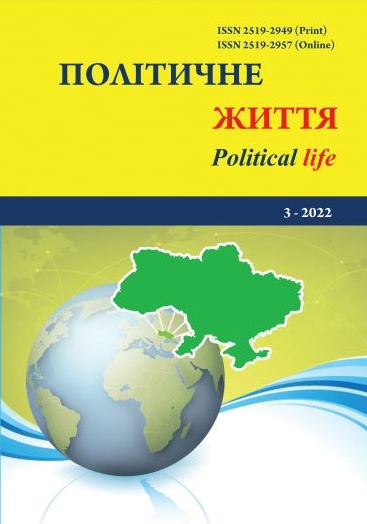Формування ціннісних орієнтацій в суспільстві в умовах війни: реалії України
DOI:
https://doi.org/10.31558/2519-2949.2022.3.11Keywords:
values; armed conflict. Instrumental values; terminal values; Schwartz’s basic human values theoryAbstract
The article actualizes the concept of values and value orientations of a society and analyses the influence of war on the shift of the value paradigm. The author has determined that during the last seventy years (after the end of World War II) the values of peace, tolerance, multiculturalism and non-violent interaction were propagated and promoted in Western societies, including the Ukrainian society after an independent Ukraine was established. The values of aggression, expansion and violence in all its manifestations were presented in an extremely negative light and were condemned. With the start of the Russian-Ukrainian war, value orientations of the Ukrainian society had to change as the country faced the threat of physical destruction. The purpose of the article was to determine on the example of Ukraine the peculiarities of shaping and functioning of values and value orientations in a society in conditions of an armed conflict. The article describes the two most popular approaches to classification and structuring of values, namely, the Schwartz’s theory of basic human values and the Milton Rokeach’s Model of terminal and instrumental values. In the course of the study, the author concluded that basic values, once formed in an individual or a group, do not disappear, however the changes of external circumstances and factors may cause the change of value hierarchy, thus causing a change of behavioural patterns and beliefs of an individual or a group, but these changes are not permanent. The article analyses the data of the Ukraine in World Values Survey 2020 Analytical Report, which shows an increase (compared to the figures of 2011) in the number of Ukrainians who are ready to accept authoritarian presidential rule or even army rule, however, at the same time the average score indicating the importance of living in a country that is governed democratically has increased. This may be explained by the fact that in situations when survival became a priority for mankind, such values as group solidarity, traditionalism, rejection of otherness and submission to strong leaders are being actualized. However, when the threat passes, the value system restructures and returns to the previously formed value hierarchy, which manifests itself in behavioural patterns and beliefs
References
Adams, D., & Bosch, S. (1987). The myth that war is intrinsic to human nature discourages action for peace by young people. In J. M. Ramírez, R. A. Hinde, & J. Groeble (Eds.), Essays on violence. Seville: University of Seville Press, 1987. pp. 121–137.
Ball-Rokeach, S. J., & Loges, W. E. Making choices: Media roles in the construction of value choices. In C. Seligman, J. M. Olson, & M. P. Zanna (Eds.), The psychology of values: The Ontario symposium (Vol. 8), Mahwah, NJ: Lawrence Erlbaum Associates, 1996. pp. 277–298.
Fry, D. P. The human potential for peace: An anthropological challenge to assumptions about war and violence. New York: Oxford University Press, 2006. 384 р.
Hofstede, G. Cultures and organizations: Software of the mind. Maidenhead: McGraw-Hill, 1991. 576 p.
Huesmann, L. R. An information processing model for the development of aggression. Aggressive Behavior, Vol. 14,1988. pp. 13–24.
Obama, B. Remarks by the President at the Acceptance of the Nobel Peace Prize. URL: https://obamawhitehouse.archives.gov/the-press-office/remarks-president-acceptance-nobel-peace-prize (Дата звернення: 10.08.2022)
Rohan, M. J. A rose by any name? The values construct. Personality and Social Psychology Review, 4 (3), 2000. pp. 255–277.
Rokeach, M. The nature of human values. New York: Free Press, 1973. 438 p.
Schwartz, S. H. Universals in the content and structure of values: Theory and empirical tests in 20 countries. In M. Zanna (Ed.), Advances in experimental social psychology (Vol. 25). New York: Academic Press, 1992. pp. 1–65.
Schwartz, S. H., & Sagiv, L. Identifying culture-specifics in the content and structure of values. Journal of Cross – Cultural Psychology, No. 26, 1995. pp. 92–116.
Ukraine in World Values Survey 2020. Resume of an Analytical Report. URL: http://ucep.org.ua/wp-content/ uploads/2020/11/WVS_UA_2020_report_ENG_WEB.pdf (Дата звернення: 10.08.2022)

